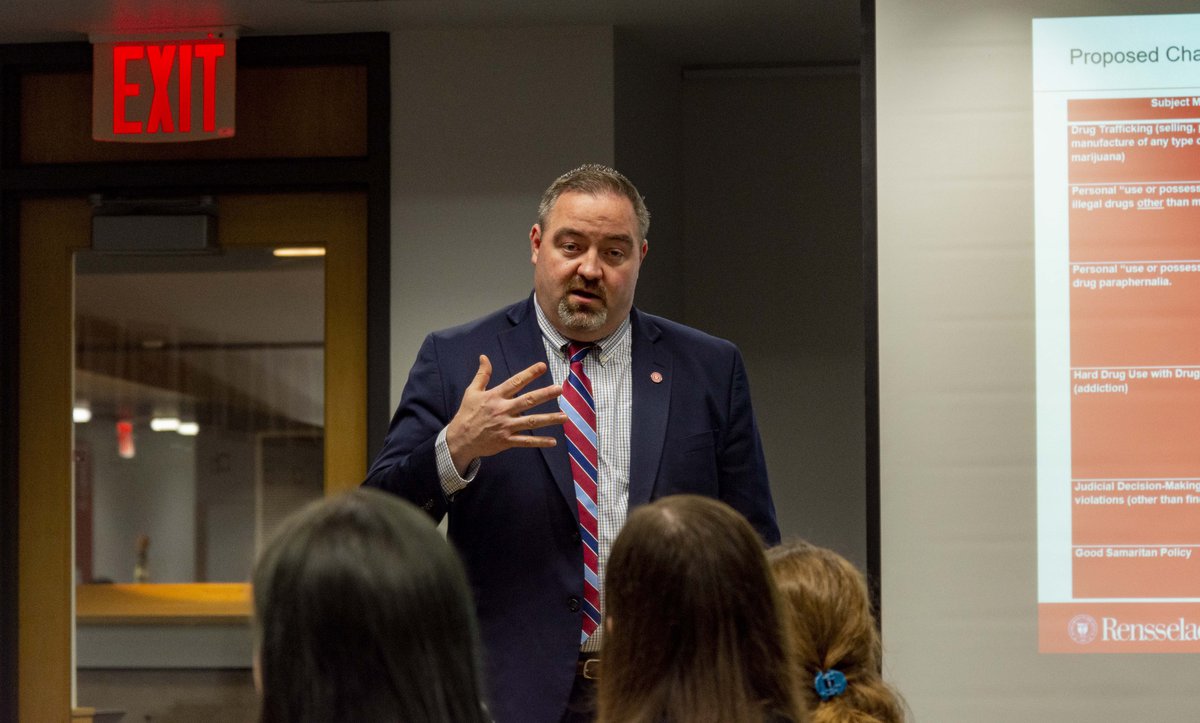Apgar presents new alcohol and drug policies to Senate

In an email sent to the Rensselaer community on March 27, updates to the “Alcohol and Other Drugs Policies” in the Student Handbook of Rights and Responsibilities were announced to students. In an open meeting on April 8, Dean of Students Travis Apgar presented these changes to the Student Senate and fielded its questions.
The updated policy—which will go into effect May 19, 2019—includes several changes, some of which increase penalties surrounding violations of alcohol and drug restrictions. The policy includes different repercussions for marijuana and all other drugs: a first violation with marijuana could result in “disciplinary probation,” while a second violation for other drugs resulted in expulsion “without the possibility of return.”
Multiple members of the Senate expressed their concerns with this policy. Graduate Senator Joshua Beard noted that expelling students with habitual drug use issues takes away their access to the rehabilitative resources the Institute provides. Apgar responded saying this was something those involved in creating the changes discussed at length, and decided “that we’re about education first and foremost, and that we believe that if somebody is a habitual user, that its best for them to go somewhere where they can get those resources.”
Visitors and senators alike disagreed with this philosophy, and believed that students should be able to reach out for help with the expectation of amnesty. Apgar then clarified that the penalty for hard drug possession is only applied to students when “their habitual use actually poses a risk to everybody else,” and a student who had not yet been caught violating policy could get confidential support from the counseling center. Former President of the Union Justin Etzine ’19 G’20 suggested a clarification of this point within the document, as it was not his first impression on reading the policy. His sentiments were echoed by current President of the Union Caitlin Kennedy ’20, Graduate Senator Neha Keshan, and Facilities and Services Committee Chairperson Nancy Bush ’19.
Apgar also presented on the new minimum punishment of two year suspension for organizations caught providing alcohol to minors. He explained that this was meant to “change the culture” surrounding alcohol, and to hopefully decrease the necessity of it in social situations. When reviewing other institutions’ policies, Apgar cited that he found a five to six year suspension was standard to promote “a change in culture” in organizations, but hoped two years would be enough for Rensselaer.
Along with this change came the prohibition of events involving alcohol in on-campus residencies, and a shift to hosting social events at outside locations with third party vendors. Though he never specifically acknowledged that this policy would end sanctioned parties in Greek houses, he referred to this throughout the discussion. In his explanation, he stated that the school has allowed groups whose members are mainly under 21 to manage events serving alcohol, and would like to “take this responsibility” from Greek organizations. Upon prompting from Independent Senator Emmanuel Gerardino ’20, Apgar clarified that the current parties being hosted create liability issues for the fraternities hosting them, and the new process would shift this liability to the permitted vendor used.
The final changes discussed related to the Good Samaritan Policy. The new regulations codify a punishment for students who do not initiate use of the Good Samaritan policy in a situation in which students are in need of help. Apgar explained the desire of the Institute to create an excuse for students who feel uncomfortable putting their organization at risk in order to invoke the policy, considering it does not give amnesty to those who supplied the patient with alcohol. “If you need somebody to motivate you, if you need somebody to blame for why you had to call for help, you can blame us,” said Apgar.
Apgar noted that this policy, in reference to others, was “pretty strict” but expressed his belief that the best policy is a clear one. “If you want people to understand what the expectations are and also follow the expectations and policies, you have to be able to figure out what they are. And we have to be able be really clear about what they are,” he said.

 Greek Life
Greek Life
 Student Senate
Student Senate
 Executive Board
Executive Board